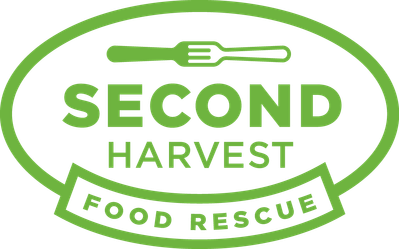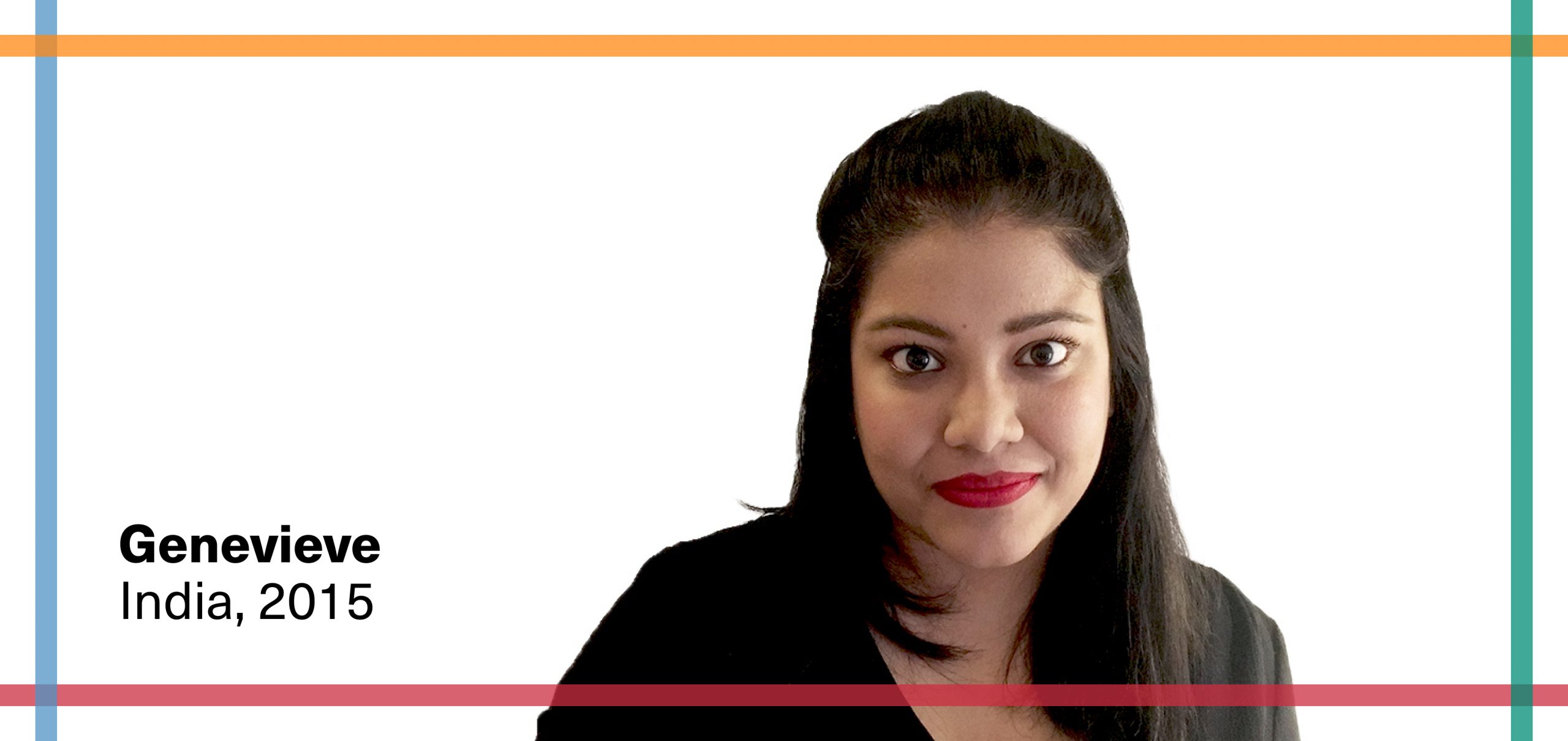From an interview with Genevieve Raveau.
Genevieve Raveau spent the first twenty-five years of her life in India. Born in New Delhi, she moved to Bangalore when she was four years old. Genevieve discovered her strong affinity for people, communication and community service. At the age of twelve, she taught English, maths and sciences to underprivileged children at a free community school founded by her family. Later, she graduated with a Master’s degree in English and a Bachelor’s degree in communications and media studies. When she was twenty-five, Genevieve decided to move to Canada and pursue a career in public relations where she could speak to and for people. Genevieve brought her strong sense of community service to her life in Canada, along with her education and experience. Here’s her story.
The name Genevieve means woman of the people. I feel that over my life, I have been growing into my name. Before I was born, my grandmother told my parents that the new baby should be named Genevieve. I think she was inspired by a book she was reading about the French Saint Genèvieve, who lived a life of prayer and charity. It is a very uncommon name in India, but my parents went ahead and named me Genevieve. My family pronounces it jen-nuh-veev, but I’m married to a French man who calls me jahn-vee-ev. People in India call me Jenny for short because Genevieve is tough to pronounce.
My grandmother was my inspiration. She and my grandfather were not well off in any way. They had nine children and took in one of her nephews whose parents had passed away. Even though she was looking after ten kids, she would bring disadvantaged children home, give them free meals, and teach them the A, B, C’s. I remember my parents would buy rations like rice and lentils and give them to widows and the elderly who could not afford food.
Around the same time, my aunt from the U.S. came to India and started a community school called Gateway International, where she took in orphans and educated children for free. When I was around 10 years old or so at that time, I would go to that school and teach other kids; I taught them mathematics, English, and science mostly. From the time I was 12, I spent each summer teaching at the school.
Seeing my family help the underprivileged, how they would give to people, how they would teach them, how they would feed them instilled in me the values of giving back. But it all started with my grandmother. She passed that on to her children and then her grandchildren. All of her kids around the world have raised great families and helped their communities. She would say, “I’m beyond blessed. The more you give, the more you get, even though you don’t expect.” I brought my grandmother’s hardworking spirit and sense of community service with me.
Moving to Toronto was meant to be
My move to Canada was pretty spontaneous. It happened in August of 2015 when I’d just been promoted at a global tech company in India. I had been working there for five years as a technical writer. I had also just received a job offer at another firm. My career was going pretty well.
This was the moment I decided to leave my comfort zone and fly across the globe to Toronto, Canada, to pursue my creative dream. I remember that very same night I went online, and I found the postgraduate public relations program at Humber College in Toronto. I had no idea how competitive it was to get in and decided this was the only thing I would apply for. I applied, did an interview, and before I knew it, I got through. I applied for my study permit and received it within days. I thought, “This is destiny. It’s meant to be.”
During my time at college, I networked quite a bit. I realized I needed to get an internship, and I’d have to start pretty much from scratch because my tech experience wouldn’t count in public relations. I did a ton of research to find out what I wanted to do, where I wanted to go and where I wanted to build my career. I targeted five top PR agencies.
The first step was to make connections and build my network. Since I was a student, I leveraged the help of my professors because they had such vast networks. They connected me to Humber graduates on LinkedIn who already had successful jobs in the PR industry. My professors knew the agencies that I was specifically targeting, so they connected me with people in those specific agencies.
I went on informational coffee chats with people from each of those agencies. I asked them for tips on how I could improve my resume. I asked what other skill areas I could grow in and what other things they would look for when hiring someone for their team. We were also encouraged to be part of societies, such as CPRS (Canadian Public Relations Society) and IABC (International Association of Business Communicators). So, I would then attend all of those events and network with people further.
Careers start with connections. Networking starts at college
I started my career because two people I had connected with took a chance on me and gave me my first role in public relations. I had an internship at one of the top global PR agencies, and I worked there for two years – and I got the role while I was still in college. You could say that I spent a lot of time building up my connections while studying so that I would have a job in hand by the time I graduated.
I found my first job through networking. In the marketing and communications industry, I would say 80 per cent to 90 per cent of the jobs are through networking and references, especially in Canada. It’s very important as a newcomer to build that network. Unless you work with people, they cannot provide a reference for you. But if you do meet with people and learn from them and keep that connection alive, there are chances that they would reach out to you and say, “Hey, I have a job available. Do you want to interview for it?”
That is still the case today.
People reach out to me whenever there’s a job available and say, “Are you interested, or do you know someone who would fit this role?” And it’s all because of networking.
Since a lot of people were working from home during COVID-19, a lot of them are taking time off to just help other people having video coffee chats. There is a program called PR Ramp, a student-focused PR Organization that connects students and grads with PR professionals. These mentors will have one-on-one sessions with students or graduates. I have been a mentor. It’s one way I know I can help.
Tips for a successful job search in Canada1. Research and self-studyWhen you arrive in Canada, it’s essential to learn about the country, the province and city you’re living in, as well as the market or industry you want to work in. You will be competing with Canadians for the same jobs – and they have had decades of experience here. So, keep reading up and learn as much as you can to be on par with the competition. 2. Network, network, networkThe majority of jobs in Canada are filled through networking and references. It’s extremely important to (virtually) meet people in your industry, learn from them and make friends, as well. But, networking should not stop when you find a job. You need to continue focusing on building new relationships and maintaining them. That’s how you’ll land your next opportunity. 3. Find a mentorMy husband and I found mentors to help us break into the Canadian industry we were in. As my husband is French, he found a French mentor who could relate to his own experiences. Likewise, I found a mentor in my industry who I could rely on to talk to about the issues I was facing and help me gain insight on how to overcome them. You may ask, “How do I find a mentor?” While networking with people, you will come across someone who connects with you at a deeper level than others. Don’t be afraid to ask that person if they would be open to touching base, sharing any advice on the next steps – being your mentor. 4. Reach out to the hiring teamIn quite a few other countries and cultures, I know that we don’t usually reach out to hiring managers or HR managers while submitting a resume. I have found it highly beneficial to ask for a connection to introduce me to a hiring team member, or I reached out directly through LinkedIn Premium if I didn’t have a mutual connection. It’s perfectly fine to show your interest in a role and explain why you would best fit the role. With open positions receiving over 1,000 applications these days, it’s becoming more difficult to stand out. So, reaching out does help. At the same time, do not be pushy or aggressive. Be patient, and your opportunity will come your way. 5. Say “Thank You”Canada is a nice place. Canadians are nice people. Saying thank you after a job interview, informational interview, or even a coffee chat is so important. And honestly, showing our appreciation is the least we can do. I always send a thank-you email on the same day as meeting someone who took time off to interview me or to just chat with me. I have also mailed handwritten thank-you notes. During COVID-19, I hand wrote cards, snapped pictures of them and emailed those pictures to every single person who interviewed or chatted with me. |
|---|
I started at PR agencies because I knew that was the fastest way to grow my career. And since I was starting from the ground up, it was going to be faster for me to learn about all the different industries working in an agency. I worked on CPG (Consumer Packaged Goods), finance, retail, tech and corporate accounts and gained a lot of valuable experience. At many agencies, you could work fifty to sixty hours a week. It’s agency life.
After my daughter was born (whose middle name is my grandmother’s), I joined a software-as-a-service (SaaS) company. My years of tech experience in India were taken into account, along with my public relations experience. Now I have a senior-level role, which is still in public relations but is focused on this company and the tech industry where I began. Working in a corporate role also offers the opportunity for a good work-life balance to do other things with my family and my community.
Giving back is important: Time, talent and treasure
My husband and I believe in giving, and we use a rough formula. Ninety percent goes to your career, your home and your life and ten per cent goes to others – it could be 15 or 20 per cent depending on life circumstances.
There was a point during COVID where I had lost my job, and I was on maternity leave, and we didn’t have as much money, but we continued to put some aside to help others. Even if you aren’t able to provide support to people financially, you can help them by just being there. Whether it’s ten per cent of your time, your talent or your treasure, you can make a difference.
I know how hard it is to start out in a new country. Even though I had family, there were times I was low and I was alone. So there are times that you feel really lonely, especially during COVID. Professionally, I mentor and help people – especially newcomers or women of colour – get into communications and help them grow. It’s either my Wednesday nights or part of my Saturdays.
There are so many ways to help. You can do things from home, or you could pack food, pack health kits, deliver food to people in need or even write letters to elderly people. Whichever cause you feel close to your heart, you can select and then help out. Even if you don’t have time, you can donate money or even food. You can actually select which food items you want to be delivered to food banks.
 |
 |
 |
If you need assistance during this difficult time, there are many free services for newcomers. Someone told me recently about Lunch Club, where you can connect and build your professional network. Most community hubs are now virtual, so you can meet up and make new friends there.
The near future is uncertain because of COVID, but I would love to continue to grow in the field of communications. I would love to someday be head of communications for a great organization out there. When I moved here, my goals were focused only on me. Now it’s also about my family and what’s best for them. My community goal is to keep doing what I’m doing – what my grandmother did.
Once we are beyond the pandemic, I look forward to opening my home again to people. For the past three years, my husband and I have invited people from the community who didn’t have a home to go to for Christmas. That’s how my husband and I met. I hosted a Christmas gathering at my home, and he came over to spend Christmas with the community because he didn’t have any family here. That’s how we hit it off. And we’re married now.
I know a lot of newcomers have moved here, far away from their families and can feel out of place. The holiday season is a time when you can sometimes feel extra lonely when you’re on your own. If I can help newcomers and be that warm voice to say, “Welcome home,” that would be great.




